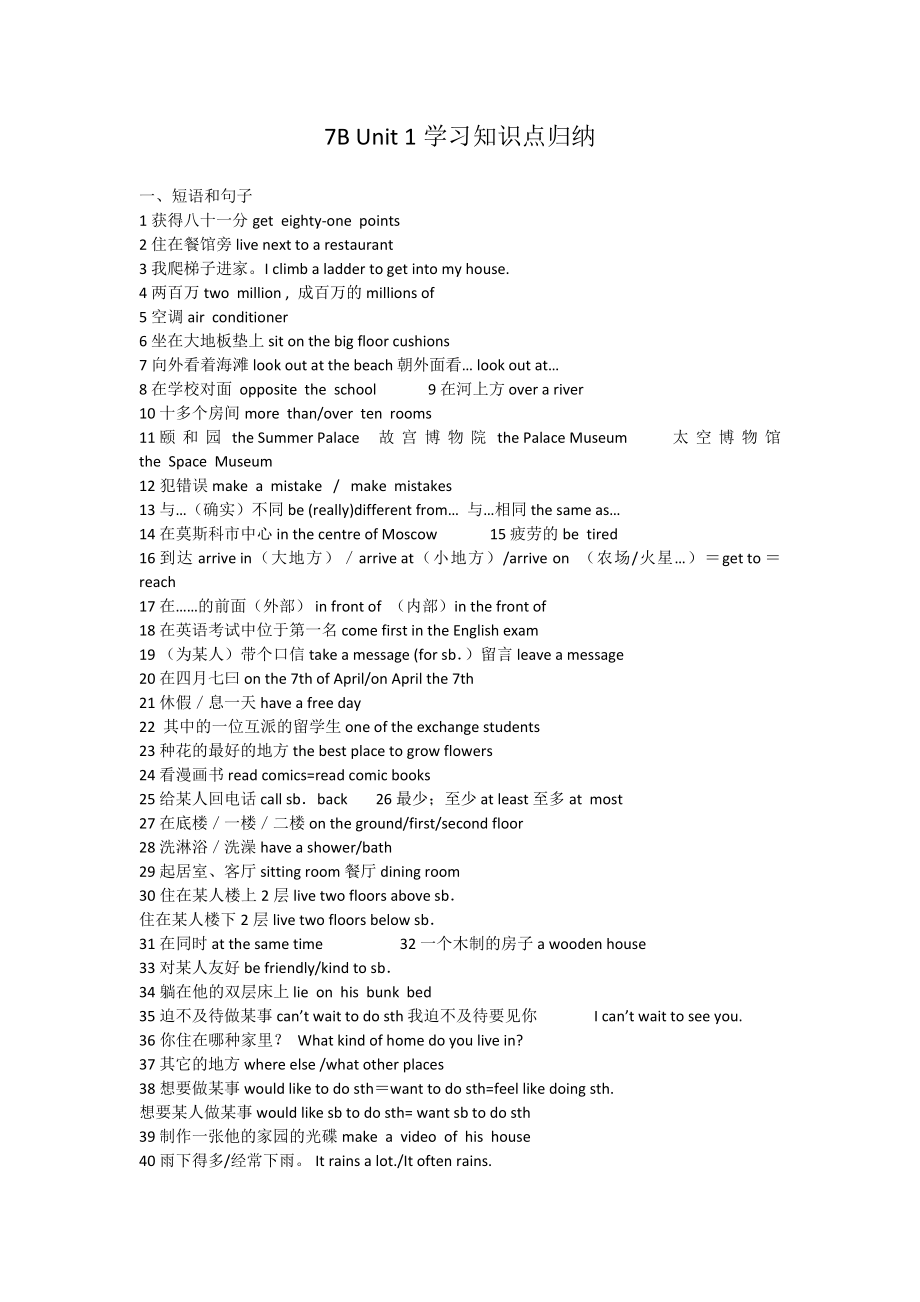《牛津英語(yǔ)7B Unit 1學(xué)習(xí)知識(shí)點(diǎn)歸納》由會(huì)員分享�,可在線閱讀,更多相關(guān)《牛津英語(yǔ)7B Unit 1學(xué)習(xí)知識(shí)點(diǎn)歸納(2頁(yè)珍藏版)》請(qǐng)?jiān)谘b配圖網(wǎng)上搜索��。
1�、7B Unit 1學(xué)習(xí)知識(shí)點(diǎn)歸納
一�����、短語(yǔ)和句子
1?獲得八十一分get? eighty-one? points??
2?住在餐館旁?live?next?to?a?restaurant
3?我爬梯子進(jìn)家�。I?climb?a?ladder?to?get?into?my?house.
4?兩百萬(wàn)two? million?, 成百萬(wàn)的?millions of?
5?空調(diào)air? conditioner???
6?坐在大地板墊上?sit?on?the?big?floor?cushions?
7向外看著海灘look?out?at?the?beach?朝外面看…?lo
2��、ok?out?at…?
8?在學(xué)校對(duì)面? opposite? the? school??? 9?在河上方?over?a?river?
10?十多個(gè)房間more? than/over? ten? rooms??
11?頤和園?the?Summer?Palace? 故宮博物院?the?Palace?Museum 太空博物館 the? Space? Museum????
12犯錯(cuò)誤?make? a? mistake?? /?? make? mistakes?????
13?與…(確實(shí))不同?be?(really)different?from… 與…相同?the?sam
3���、e?as…?
14?在莫斯科市中心?in?the?centre?of?Moscow? 15?疲勞的be? tired????
16?到達(dá)?arrive?in(大地方)/arrive?at(小地方)/arrive on (農(nóng)場(chǎng)/火星…)=get?to?=reach?
17?在……的前面(外部)?in?front?of (內(nèi)部)in the front of?
18?在英語(yǔ)考試中位于第一名?come?first?in?the?English?exam
19?(為某人)帶個(gè)口信?take?a?message?(for?sb.)留言?leave?a?message?
4�、20?在四月七曰?on?the?7th?of?April/on April the 7th
21?休假/息一天?have?a?free?day?
22??其中的一位互派的留學(xué)生?one?of?the?exchange?students
23?種花的最好的地方?the?best?place?to?grow?flowers
24?看漫畫(huà)書(shū)?read?comics=read?comic?books
25?給某人回電話?call?sb.back? 26?最少�;至少?at?least?至多at? most??
27?在底樓/一樓/二樓?on?the?ground/first/s
5、econd?floor?
28?洗淋?。丛?have?a?shower/bath?
29?起居室����、客廳?sitting?room?餐廳?dining?room?
30住在某人樓上2層?live?two?floors?above?sb.?
住在某人樓下2層?live?two?floors?below?sb.??
31?在同時(shí)?at?the?same?time? 32?一個(gè)木制的房子?a?wooden?house?
33?對(duì)某人友好?be?friendly/kind?to?sb.
34躺在他的雙層床上?lie? on? his? bunk? bed??
6、????
35?迫不及待做某事?can’t?wait?to?do?sth?我迫不及待要見(jiàn)你 I?can’t?wait?to?see?you.
36你住在哪種家里�����? What?kind?of?home?do?you?live?in??
37?其它的地方?where?else?/what other places
38?想要做某事?would?like?to?do?sth=want?to?do?sth=feel like doing sth.
想要某人做某事?would?like?sb?to?do?sth=?want?s
7���、b?to?do?sth
39?制作一張他的家園的光碟make? a? video? of? his? house??
40?雨下得多/經(jīng)常下雨��。?It?rains?a?lot./It often rains.?
41?請(qǐng)某人接電話好嗎��?(電話用語(yǔ))?May?I?speak?to?sb.����??
42?聽(tīng)起來(lái)很棒?That?sounds?great?/wonderful.
43 配有12個(gè)淋浴器和4個(gè)浴缸的房間
a? room? with? twelve? showers? and? four? baths????????????
二、知識(shí)
8�、點(diǎn)
1.方位介詞
a) at表示"在......處",一般指較小的比較具體的地點(diǎn)����。
如:He isn't at school. He is at home. 他不在學(xué)校,他在家��。
b) in表示"在......內(nèi)部��;在......里面"的意思����。如:What is in the box?
c) on表示"在某物的上面",但兩者互相接觸���。如:My books are on that table.
d) under表示"在某物垂直的正下方"����,兩者之間不接觸。如:My cat is under my chair. 我的貓?jiān)谖业囊巫酉隆?
e) behind表示"在某物體的后面"�����。如
9�、:The broom is behind the door.
f) in front of表示"在......的前面",正好與behind相反����。如:There are some big trees in front of our classroom. 我們教室前面有幾棵大樹(shù)。
g) near表示"在某物體的附近"�,意為"接近、靠近"�。如:The ball is near the door.
注:a)介詞in, on, under, behind是表示靜態(tài)位置的介詞。b)介詞 in�,on,to 都可以用來(lái)表示某個(gè)位置的方向����,它們的意義不同����,表示的方向及范圍也不同:
1. in 表示
10、方位���,含義是“在……之內(nèi)”�����,即一個(gè)小地方處在一個(gè)大地方的范圍(疆域)之內(nèi)�����。例如: China is in the east of Asia. 中國(guó)在亞洲東部���。(中國(guó)是亞洲的一個(gè)國(guó)家�,處于亞洲的范圍之內(nèi)) Taiwan lies in the east of China. 臺(tái)灣在中國(guó)的東部��。(臺(tái)灣是中國(guó)東部的一個(gè)省份�,是中國(guó)的領(lǐng)土,在中國(guó)的疆域之內(nèi))
2. on 表示方位��,含義是“在……端/邊”��,即一個(gè)地方在另一個(gè)地方的某一端或某一邊���,兩個(gè)地方只是相鄰或接壤�,卻互不管轄。例如:Guangdong Province is on the southeast of Guangxi.
11�、廣東省在廣西的東南邊。(廣東省與廣西在地理位置上是連在一起的���,即兩者相鄰����,卻互不管轄)
3. to 表示方位����,含義是“在……面”,即一個(gè)地方在另一個(gè)地方的范圍之外��,互不管轄����。尤其當(dāng)兩個(gè)地方相隔較遠(yuǎn),且有湖泊��、大海等區(qū)域相隔時(shí)��,通常用 to����。例如:Japan is to the east of China. 日本在中國(guó)的東面。(日本在中國(guó)范圍之外��,且有日本海分隔)
4. 把河流����、山脈、鐵路等事物當(dāng)做兩地的分界線或基點(diǎn)�,且不說(shuō)明河流、山脈����、鐵路等是屬于哪一方,通常使用介詞 to�����,譯為“以……(方向)”��。此外�����,表示一個(gè)地方離另一個(gè)地方有多遠(yuǎn)����,也用 to�。例如:The village lies to the south of the hill. 那座村莊在山的南面���。
 牛津英語(yǔ)7B Unit 1學(xué)習(xí)知識(shí)點(diǎn)歸納
牛津英語(yǔ)7B Unit 1學(xué)習(xí)知識(shí)點(diǎn)歸納

